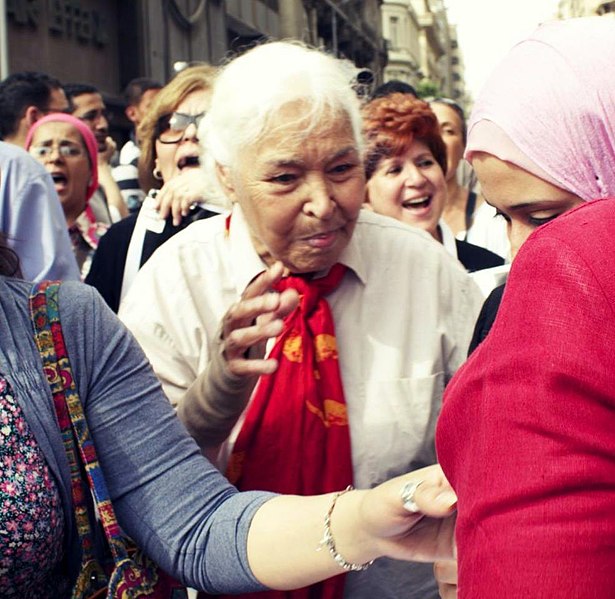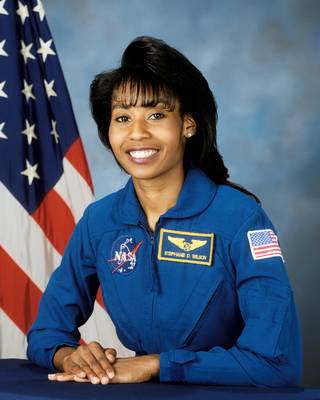Celebrating Women’s History Month
To celebrate Women's History Month, Simon’s Rock faculty, students, and staff spotlighted one of the following central figures in women's history nearly every day throughout March 2021.
The project was spearheaded by our Council for Equity and Inclusion and faculty member in anthropology and linguistics, Nancy Bonvillain.
ARTS
Photo: WikiMedia Commons
Marian Anderson (1897–1993)
An American contralto who performed a wide range of music, from opera to spirituals, Marian performed with renowned orchestras in major concert and recital venues between 1925 and 1965, and was an important figure in the struggle for African American artists to overcome racial prejudice in the United States during the mid-twentieth century. Learn more.
Photo: WilkiMedia Commons
Hallie Flanagan (1890–1969)
A theatrical producer, director, playwright, author, and director of the Federal Theatre Project (part of the Works Progress Administration) Flanagan was the first woman to be awarded a Guggenheim Fellowship. Learn more.
Photo: MarthaGraham.org
Martha Graham (1894–1991)
A groundbreaking dancer and choreographer whose vision and technique revolutionized dance in the early 20th century. Learn more.
Photo: WikiMedia Commons
Lorraine Hansberry (1930–1969)
The first black woman to have a play produced on Broadway and the youngest American to win the New York Drama Critics Circle Award for Best Play of the Year for A Raisin in the Sun in 1959. Learn more.
Indigenous Rights

Photo: WomensHistory.org
Amanda Blackhorse (1982 – Present)
A psychiatric social worker, indigenous rights activist, and member of the Navajo Nation who served as the plaintiff in the 2006 lawsuit Blackhorse et al v. Pro-Football Inc., suing against the use of racist and demeaning sports team names. Learn more.

Photo: WomensHistory.org
Elouise Cobell (also known as Yellow Bird Woman) (1945–2011)
A member of the Blackfoot Nation, tribal elder and activist, banker, rancher, and lead plaintiff in a class-action lawsuit (Cobell vs. Salazar) against the Department of Interior for mismanagement of tribal account funds dating back to the 19th century. Learn more.

Photo: Idle No More
Idle No More
A Canadian grassroots indigenous/environmental movement founded by four women, focused on the Treaty People in Manitoba, Saskatchewan, and Alberta, to fight the Canadian government’s dismantling of environmental protection laws, which endanger the First Nations who live on the land. Learn more.
LGBTQ+ Rights

Photo: M. Sharkey, The New York Times
Robina Asti (1921-2021)
A groundbreaking transgender rights activist and World War II veteran, Asti won a landmark Supreme Court ruling in 2013, forcing the Social Security Administration to change its policy to allow transgender people to claim survivor benefits on the basis of their own documentation. Learn more.

Photo: WikiMedia Commons
Emma Goldman (1869–1940)
An outspoken feminist and queer leader who published an anarchist and feminist periodical, Mother Earth, and whose view of feminism centered on the belief that people should be free to control their own lives and, notably, their own sexuality. Learn more.

Photo: Reproductive Health Access Project
Marsha P. Johnson (1945–1992)
An outspoken activist for LGBTQ+ and specifically transgender rights, Johnson was one of the principal leaders of the Stonewall Uprising of 1969 in response to police raids and harassment of customers at gay bars throughout New York City. Learn more .

Photo: Carolina Digital Library and Archives
Pauli Murray (1910–1985)
A social justice advocate focused on the rights of people of color and LBGTQ+ communities, Murray worked to end segregation on public transportation, was one of the founding members of the Congress of Racial Equality, and helped found the National Organization of Women. Learn more.
Social Justice & Politics

Photo: WikiMedia Commons
Loujain al-Hathloul (1989 – Present)
A Saudi women’s rights activist known for bringing attention to injustices through viral videos on social media, including her protest against Saudia Arabia’s law banning women from driving by posting videos of herself driving home from the Riyadh airport. Learn more.
Photo: EllaBakerCenter.org
Ella Baker (1903–1986)
The granddaughter of slaves, Baker was deeply involved in social justice work and helped found the Southern Christian Leadership Conference to focus on work in voter registration, the Student Nonviolent Coordinating Committee (SNCC) to combat Jim Crow laws in the South, and helped organize the Freedom Rides in 1961 and the 1964 Freedom Summer to register African-American voters in Mississippi. Learn more.

Photo: WikiMedia Commons
Sarah Bagley (1806-1889)
A textile mill worker and labor organizer, editor, peace activist, and campaigner for women's suffrage, Bagley was notable for her activism in instituting work condition reforms in the mills of Lowell, Massachusetts in the 19th Century. Learn more.

Photo: WikiMedia Commons
Shirley Chisholm (1924–2005)
The first African American woman elected to the U.S. Congress from the Democratic Party and the first Afircan American woman to ever run for President, Chisholm had a reputation as a radical progressive champion of her working-class and often marginalized constituents. Learn more.

Photo: WikiMedia Commons
Angela Davis (1944 – Present)
A scholar and social justice advocate active in the Black liberation movement as part of the Black Panthers and an all-Black branch of the Communist Party who later became a prolific writer on topics of race, class, gender, and sexuality. Learn more.

Photo: WikiMedia Commons
Nawal el Saadawi (1931–2021)
An Egyptian humanitarian, activist, secularist, and physician who worked tirelessly to improve conditions for women and for poor and marginalized people to have access to better education, healthcare, and living conditions. Learn more.
Photo: ElizabethFreemanCenter.org
Elizabeth Freeman (1742–1829)
Also known as “Mumbet” or “Bet,” Freeman was among the first slaves in Massachusetts to sue for and win her freedom, and was widely recognized and in demand for her skills as a healer, midwife, and nurse. Learn more.
Photo: WikiMedia Commons
Elizabeth Gurley Flynn (1890–1964)
An American labor organizer, political radical, and communist who helped organize the Industrial Workers of the World (IWW), was a founding member of the American Civil Liberties Union (ACLU), and was a strong defender of women's rights, birth control, and women's suffrage. Learn more .
Photo: DOI.gov
Deb Haaland (1960 – Present)
A citizen of the Pueblo of Laguna in New Mexico, the first Native American woman to serve as the Secretary of the Department of Interior (Haaland was sworn in by Vice President Kamala Harris, the first woman to ever hold that position). Learn more.
Photo: DoloresHuerta.org
Dolores Huerta (1930 – Present)
Founder of the Agricultural Workers Association—which focused on voter registration and workplace safety—who also worked with Cesar Chavez to found the National Farm Workers Association (later the United Farm Workers) and advocated for the California Agricultural Labor Relations Act of 1975, giving farmworkers in the state the right to collectively organize for wages and working conditions. Learn more.
Photo: WomensMediaCenter.com
Mamá Tingó (1921–1974)
An Afro-Latina from the Dominican Republic, she was a fierce defender of the rights of rural farmers who worked their land for decades and became the leader of the Federation of Christian Agrarian Leagues, organizing protests and rallies to protect farmers’ rights. Learn more.
Photo: CollectiveSpeakers.com
Bree Newsome (1985 – Present)
A filmmaker, musician, speaker, and activist from Charlotte, North Carolina, known for her act of civil disobedience when she was arrested for removing the Confederate flag from the Columbia, South Carolina statehouse in the aftermath of the murder of eight African American parishioners and their pastor by a white supremacist in the Emmanuel AME Church in Charleston. Learn more.
Photo: WikiMedia Commons
Jeannette Rankin (1880–1973)
The first woman ever elected to the United States Congress, in 1916, four years before the 19th amendment solidified women's right to vote in all elections. Learn more.
Photo: Library of Congress, Washington, D.C.
Lucy Stone (1818–1893)
A leading suffragist and abolitionist, she was the first Massachusetts woman to earn a college degree, defying gender norms when she famously wrote marriage vows to reflect her egalitarian beliefs and refused to take her husband’s last name. Learn more.
Photo: David Levene, The Guardian
Malala Yousafzai (1997 – Present)
The youngest person to ever receive the Nobel Peace Prize and a Pakistani campaigner focusing on the rights of girls to continue their education. Learn more.
STEM

Photo: ScientificWomen.net
Inge Lehmann (1888–1993)
A Danish seismologist who, in 1929, contradicted many of the contemporary assumptions about the Earth's core by studying seismic waves collected after a large earthquake in New Zealand. Learn more.

Photo: WikiMedia Commons
Maryam Mirzakhani (1977–2017)
The first (and so far only) woman to be awarded Fields Medal for her seminal contributions to the study of hyperbolic geometry, dynamical systems (especially billiards), and Riemann surfaces in mathematics. Learn more.

Photo: Science History Images/Alamy
Chien-Shiung Wu (1912–1997)
A Chinese-American physicist During the Manhattan Project, whose work investigating beta decay, i.e. one of the decay types that occur when the nucleus of one element changes into another element, continues to be a standard reference for nuclear physicists. Learn more .

Photo: NASA.gov
Stephanie D. Wilson (1966 – Present)
A NASA Astronaut and a veteran of three spaceflights who has logged more than 42 days in space and has received several awards from NASA, including NASA Space Flight and Distinguished Service Medals, the Johnson Space Center Director’s Innovation Group Achievement Award, and the Johnson Space Center Director Commendation Award. Learn more.












